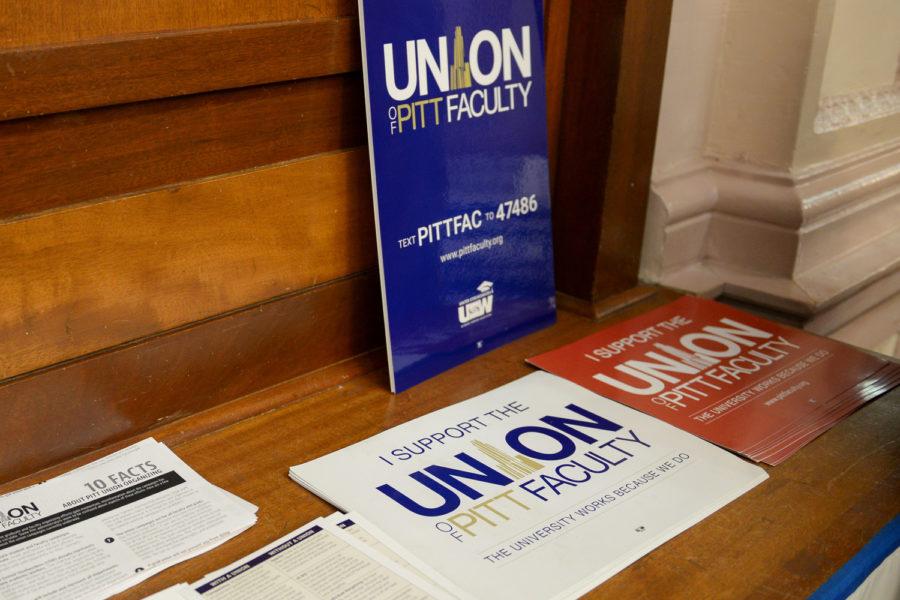Pitt faculty vote to form union by wide margin


Researchers and professors from across all Pitt campuses have voted to form a faculty union, according to a copy of an election returns document obtained by The Pitt News.
This article has been updated.
Researchers and professors from across all Pitt campuses have voted by a wide margin to form a faculty union, according to a copy of an election returns document The Pitt News obtained, setting the stage for changes in the relationship between faculty and administrators.
Out of a total of 2,203 faculty members who voted in the election, according to the document, 1,511 voted to form the union, while 612 voted against it. There are 80 challenged ballots, which isn’t enough to affect the outcome of the election. Roughly 3,000 faculty were eligible to vote in the election. Alex Peterson, a spokesperson for the Pennsylvania Department of Labor & Industry, confirmed the vote totals Tuesday evening.
The faculty union will be affiliated with the United Steelworkers’ Academic Workers Association, which has supported the unionization effort since 2016. The Steelworkers have helped faculty unionize at other local universities, including Robert Morris and Point Park.
Marian Jarlenski — an associate professor of health policy and management, as well as a union organizer, — said she’s “thrilled” with the election results. She said the large margin of victory demonstrates how much hard work the Faculty Organizing Committee put into the election.
“I’m really excited. And I’m just so proud of our organizing committee and the literally thousands of faculty who put in time and effort to make this happen,” Jarlenski said. “I’m really confident it’s going to improve our University.”
Moving forward, Jarlenski said the union will elect a “representative and inclusive” bargaining committee to identify issues on which to negotiate with the University. She said union representatives will also speak with colleagues who voted against forming a union to hear their concerns and if they might have changed their minds about unionization.
Faculty union organizers ran on a number of issues, ranging from health benefits to academic freedom. Some of the campaign’s highest priorities included improving pay, job security and transparency between the administration and faculty.
The COVID-19 pandemic brought greater attention to these and other issues. Some faculty have questioned Pitt’s commitment to shared governance and expressed concern for their safety with the return to in-person learning. Pitt also froze salaries in 2020 and included a 1.25% progressive pay raise in this year’s budget, a change that some faculty said was not enough.
Melinda Ciccocioppo, a psychology lecturer and union organizer, said she’s “excited” to form a union and “grateful” for support from the organizing committee’s allies.
A Pitt spokesperson said the University is evaluating next steps following the election results.
“While the formation of a faculty union may change how our community works together,” the spokesperson said, “it will not change our longstanding commitment to partnering with faculty members to advance their pursuits of excellence in teaching, scholarship and research.”
Union-eligible professors and researchers received election ballots and instructions starting on Aug. 27, and the Pennsylvania Labor Relations Board accepted all ballots returned by mail before Oct. 12 at 5 p.m. Ballots were not counted if they arrived late. Vote counting started Tuesday at 10 a.m. and board officials completed counting that afternoon.
The campaign to unionize Pitt faculty formally launched in January 2016, though unofficial conversations between faculty union organizers and their colleagues started years earlier. Faculty officially filed for a union election with the PLRB in January 2019. A Pitt News investigation found Pitt had included hundreds of administrators and retired professors on its list of union-eligible faculty, which is used to determine whether the required 30% threshold has been met. PLRB hearing examiner Stephen Helmerich ruled in June 2020 that the Pitt-submitted list was “factually and legally inaccurate,” and ultimately ruled on the eligibility list in April.
Over the course of the union campaign, the University declined to take a formal stance on a desired outcome of the election. Pitt has paid more than two million dollars to Philadelphia-based “union avoidance” law firm Ballard Spahr between 2016 and 2020, which union organizers had called “shameful.”
Organizers and Pitt also argued throughout the campaign on whether faculty from the School of Medicine should be included in the union’s bargaining unit. PLRB officials ultimately ruled the SOM faculty would be excluded from the union.
The campaign to unionize more than 2,000 Pitt graduate students continues, despite the PLRB upholding an April 2019 vote against unionization. Union organizers have said they plan to appeal the decision.
Recent Posts
Pitt speech and debate team heads to nationals
The William Pitt Debating Union, Pitt’s speech and debate team, sends students to both in-person…
Visuals: A Year in Review
The visuals desk had an interesting year. In the midst of the 2024 Presidential Election,…
De-stress events across campus offer students a break from studying
During finals week, departments across campus are offering wellness events to help students manage stress…
Pitt students share their summer plans
After a long and strenuous academic year, many students are excited to take a break.…
Column | Collaboration and connection make us better — yes, even in journalism
Today is the last day I will ever do this, and despite the amount of…
Column | Things done and left undone
The saddest part of it all is not the fact that I will have to…

